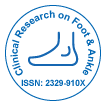Unsere Gruppe organisiert über 3000 globale Konferenzreihen Jährliche Veranstaltungen in den USA, Europa und anderen Ländern. Asien mit Unterstützung von 1000 weiteren wissenschaftlichen Gesellschaften und veröffentlicht über 700 Open Access Zeitschriften, die über 50.000 bedeutende Persönlichkeiten und renommierte Wissenschaftler als Redaktionsmitglieder enthalten.
Open-Access-Zeitschriften gewinnen mehr Leser und Zitierungen
700 Zeitschriften und 15.000.000 Leser Jede Zeitschrift erhält mehr als 25.000 Leser
Indiziert in
- Google Scholar
- Sherpa Romeo
- Öffnen Sie das J-Tor
- Akademische Schlüssel
- RefSeek
- Hamdard-Universität
- EBSCO AZ
- OCLC – WorldCat
- Publons
- Genfer Stiftung für medizinische Ausbildung und Forschung
- Euro-Pub
- ICMJE
Nützliche Links
Open-Access-Zeitschriften
Teile diese Seite
Abstrakt
Diabetes Mellitus Patients on Chronic Care Follow-Up in Southern Hospitals about Diabetic Foot Ulcer Management and Related Factors
Shivam P
Diabetes patients who have diabetic foot ulcers (DFU) have full-thickness wounds below the ankle that penetrate the dermis. Due to the rising prevalence of diabetes mellitus (DM) worldwide and the lack of awareness and practise of diabetic foot self-care, there has been an increase in the incidence of diabetic foot ulcers. As a result, the study's objective was to evaluate patients with diabetes mellitus in southern Ethiopian hospitals' knowledge of and attitudes toward diabetic foot ulcers and related factors. The investigation was carried out using a multicenter cross-sectional design. At Bedele General Hospital and Mettu Karl Comprehensive Specialized Hospital, all diabetes patients who met the study's inclusion criteria and were receiving outpatient care between August 9, 2021, and September 5, 2021 G were questioned using a semi-structured questionnaire. A social science statistical analysis tool was used to analyse the data. Most of the study participants had positive attitudes, while more than half had weak knowledge. Knowledge was highly correlated with age and educational attainment. The following factors were found to be predictive of attitudes toward diabetic foot care: monthly income, educational attainment, prior knowledge, and prior foot ulcer history. Therefore, diabetic foot care education should be offered by healthcare professionals to prevent additional foot ulcer issues. In addition, patients with poor socioeconomic level who have developed diabetic foot ulcers should receive extra care.
Zeitschriften nach Themen
- Allgemeine Wissenschaft
- Biochemie
- Chemie
- Genetik und Molekularbiologie
- Geologie und Geowissenschaften
- Immunologie und Mikrobiologie
- Klinische Wissenschaften
- Krankenpflege und Gesundheitsfürsorge
- Landwirtschaft und Aquakultur
- Lebensmittel & Ernährung
- Maschinenbau
- Materialwissenschaften
- Medizinische Wissenschaften
- Pharmazeutische Wissenschaften
- Physik
- Sozial- und Politikwissenschaften
- Umweltwissenschaften
- Veterinärwissenschaften
Klinische und medizinische Fachzeitschriften
- Anästhesiologie
- Augenheilkunde
- Betrieb
- Dermatologie
- Diabetes und Endokrinologie
- Gastroenterologie
- Genetik
- Gesundheitspflege
- Immunologie
- Infektionskrankheiten
- Kardiologie
- Klinische Forschung
- Medizin
- Mikrobiologie
- Molekularbiologie
- Neurologie
- Onkologie
- Pädiatrie
- Pathologie
- Pflege
- Toxikologie
- Zahnheilkunde

 English
English  Spanish
Spanish  Chinese
Chinese  Russian
Russian  French
French  Japanese
Japanese  Portuguese
Portuguese  Hindi
Hindi